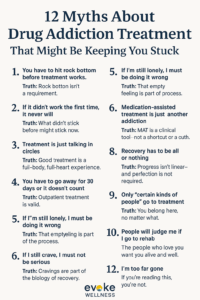In early sobriety, there’s a loneliness no one really talks about.
It’s not just about missing people. It’s missing the version of yourself you thought you were. It’s doubting whether this whole “getting better” thing is even going to work for you.
Sometimes that loneliness gets filled with myths—stories you’ve heard, stories you’ve told yourself. And when you believe those myths, it’s easy to feel stuck.
Here’s the truth: You’re not the only one carrying those doubts. And you don’t have to keep carrying them alone.
Let’s clear out some of the myths that keep people hurting longer than they need to—and let in some truth that can actually help.
Myth #1: You have to hit rock bottom before treatment works
Truth: Rock bottom isn’t a requirement. It’s just a story people tell.
You can reach out at any point—whether you’re deep in crisis or just quietly struggling. You don’t have to lose everything to earn help. You’re allowed to ask for more, just because you’re tired of hurting.
Myth #2: If it didn’t work the first time, it never will
Truth: Most people don’t get sober on their first try. That’s not failure—it’s persistence.
Addiction is complex. So is recovery. What didn’t stick before might stick now, especially with the right kind of support. Many of the team members at Evoke Wellness Ohio have seen people come back after a setback—and thrive.
Myth #3: Treatment is just talking in circles
Truth: Good treatment is a full-body, full-heart experience.
Yes, you’ll talk. But you’ll also learn coping skills, get medical support if needed, and work with people who see you as more than your past. You don’t have to figure it out alone—we help guide the process in Hilliard.
Myth #4: You have to go away for 30 days or it doesn’t count
Truth: Outpatient treatment is valid—and often exactly what people need.
Our intensive outpatient program (IOP) in Hilliard, Ohio gives you structured support while letting you stay connected to home, work, or family. Recovery can fit into your life without taking you out of it.
Myth #5: If I’m still lonely, I must be doing it wrong
Truth: That empty feeling is part of the process, not a sign of failure.
You’ve likely lost people, patterns, and routines that used to fill your day—even if they were harmful. That space feels hollow now. But over time, it gets filled with things that are actually safe and steady. For now? Just keep showing up. That’s enough.
Myth #6: Medication-assisted treatment is just another addiction
Truth: MAT is a clinical tool—not a shortcut or a crutch.
It helps stabilize your brain chemistry so that you can focus on healing. Used under medical supervision, it’s not replacing one high with another. It’s removing chaos so clarity can come in.
Myth #7: If I still crave, I must not be serious
Truth: Cravings are part of the biology of recovery—not a sign that you’re weak.
What matters is what you do with them. Treatment helps you build the tools to surf those waves instead of letting them pull you under.
Myth #8: Recovery has to be all or nothing
Truth: Progress isn’t linear—and perfection is not required.
Some days you’ll feel strong. Other days, you’ll just make it through. Both count. You don’t have to “do it right” to be worthy of continuing.
Myth #9: Only “certain kinds of people” go to treatment
Truth: Addiction doesn’t care about age, job, status, or background.
And neither does recovery. You belong here, no matter what your life looks like on paper. In fact, the people who look like they “have it together” often carry the heaviest shame. You don’t have to keep pretending.
Myth #10: People will judge me if I go to rehab
Truth: The people who love you want you alive and well.
And anyone who judges you for getting help? They’re not living your life. You are. Choosing recovery is one of the bravest things you can do—not just for you, but for the people who care about you.
Myth #11: If I ask for help, I’ll owe everyone forever
Truth: Asking for help isn’t a contract—it’s a sign of hope.
No one gets sober in a vacuum. Letting someone walk beside you for a while doesn’t mean you owe them your future. It just means you let someone care.
Myth #12: I’m too far gone
Truth: If you’re reading this, you’re not.
There is no cutoff point for being worthy of healing. We’ve seen people come back after decades of use. We’ve seen people come back after relapse, after prison, after losing everything. And still—they found their way back to themselves.
What People Say After They Start Treatment
“I didn’t think anyone would understand. But they didn’t ask me to explain everything—they just made room for me.”
– Client, 2024
“It wasn’t magic. But it was the first place I felt like I could breathe.”
– Alumni, 2023
“I thought I had to be sure. I didn’t. I just had to be tired enough to try.”
– Client, 2022
FAQs About Drug Addiction Treatment
Do I have to go to rehab to get help?
No. Many people start with outpatient programs like IOP or even weekly therapy. Rehab is one option—but not the only one.
What if I’ve already tried and failed?
Trying again isn’t failing. It’s learning. Recovery looks different for everyone. Sometimes it takes more than one attempt to find what works.
How long does treatment last?
It depends. Some programs are 30 days. Others offer long-term or step-down options. At Evoke Wellness Ohio, we help build a plan that makes sense for you.
Is it confidential?
Yes. Your participation in treatment is private and protected by law. Your employer, family, or community won’t be notified unless you choose to tell them.
What if I don’t have insurance?
Call anyway. We work with a variety of insurance plans—and can help you explore payment options if you’re uninsured.
How do I start?
It’s as simple as making a call. Our team will walk you through everything—no pressure, no shame, just answers.
Call (866)430-9267 or visit evokewellnessoh.com to learn more about our drug addiction treatment services in Hilliard, Ohio. You’re not too late. You’re just early in something better.



